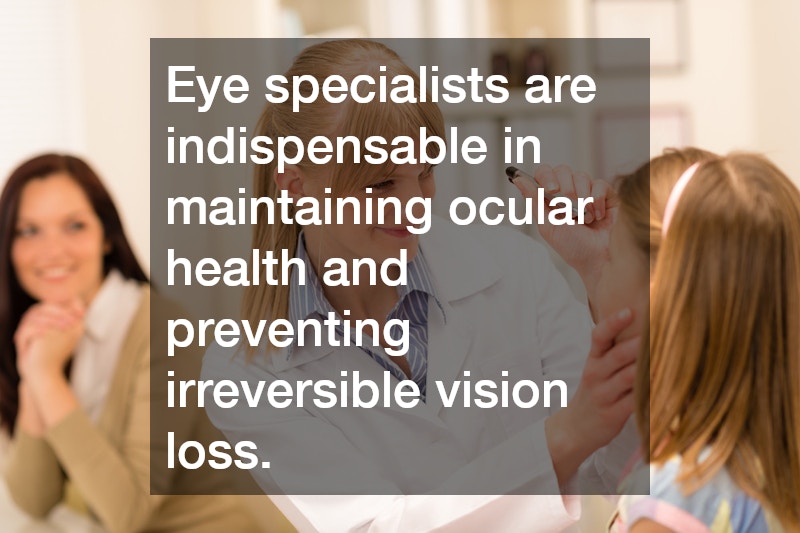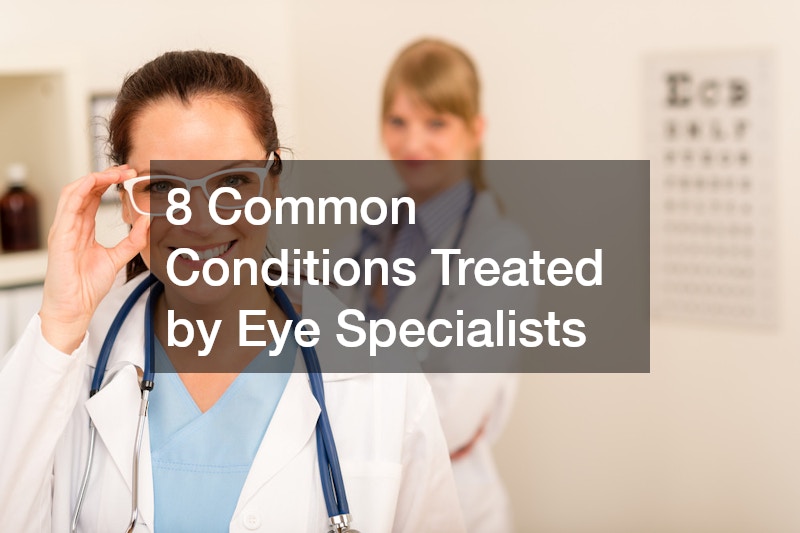Vision is a vital sense that shapes how we experience the world, yet many people only seek professional help once symptoms become disruptive. Eye specialists play a critical role in diagnosing, managing and treating a range of ocular conditions, many of which can severely impact quality of life if left unaddressed. From common concerns to complex disorders, here are eight conditions frequently treated by eye specialists and why seeking early intervention matters.
1. Refractive Errors
Refractive errors are among the most widespread vision problems globally. These occur when the eye does not properly bend (or refract) light, leading to blurry vision. The most common types include myopia (short-sightedness), hyperopia (long-sightedness) and astigmatism. Presbyopia, which typically affects people over 40, causes difficulty in focusing on close objects. Eye specialists diagnose refractive errors through comprehensive eye exams and often prescribe glasses or contact lenses. In some cases, surgical options such as LASIK may be recommended to permanently correct the issue. Early detection and tailored treatment are essential to prevent eye strain, headaches and reduced productivity.
2. Cataracts
Cataracts develop when the eye’s natural lens becomes cloudy, leading to blurred vision, glare sensitivity and difficulty seeing at night. While most cataracts form as a result of ageing, other contributing factors include prolonged UV exposure, diabetes, smoking and certain medications. Cataracts usually progress slowly and many people don’t notice changes in vision until the condition becomes advanced. Eye specialists monitor the development of cataracts and will suggest surgical removal once vision is significantly impaired. Cataract surgery is a routine and highly effective procedure that restores clear vision by replacing the clouded lens with an artificial one.
3. Glaucoma
Glaucoma is often referred to as the “silent thief of sight” because it typically progresses without noticeable symptoms until permanent damage has occurred. It involves increased pressure within the eye, which damages the optic nerve and leads to gradual vision loss. There are several types of glaucoma, with open-angle glaucoma being the most common. Eye specialists use tools such as tonometry, visual field tests and optic nerve imaging to diagnose the condition. While glaucoma cannot be cured, early detection allows for effective management using prescription eye drops, laser treatment or surgery to preserve remaining vision and prevent further damage.
4. Age-Related Macular Degeneration (AMD)
AMD is a leading cause of vision loss in older adults. It affects the macula, the part of the retina responsible for sharp central vision needed for reading, driving and recognising faces. There are two types: dry AMD, which involves thinning of the macula and wet AMD, characterised by abnormal blood vessel growth that leaks fluid or blood. Eye specialists are critical in detecting AMD in its early stages through retinal imaging. Although there is no cure for AMD, certain treatments such as anti-VEGF injections for wet AMD and lifestyle modifications for dry AMD can help slow its progression and maintain independence.
5. Diabetic Retinopathy
People with diabetes are at risk of developing diabetic retinopathy, a condition that damages the blood vessels of the retina due to prolonged high blood sugar levels. It can lead to vision impairment or blindness if left untreated. Symptoms might include blurred vision, dark spots or difficulty perceiving colours. Regular eye exams are essential for early detection, even if no symptoms are present. Eye specialists may use fluorescein angiography or optical coherence tomography to assess retinal changes. Depending on the severity, treatment options include laser surgery, intravitreal injections or vitrectomy to preserve vision and prevent further complications.
6. Dry Eye Syndrome
Dry eye syndrome occurs when the eyes do not produce enough tears or the tears evaporate too quickly. This condition can cause a gritty or burning sensation, redness and sensitivity to light. It may result from environmental factors, hormonal changes or long-term screen use. While it may seem like a minor inconvenience, chronic dry eye can significantly impact daily life and cause long-term damage to the eye’s surface. Eye specialists diagnose dry eye through tear film analysis and recommend personalised treatment plans, including artificial tears, prescription medications or procedures to improve tear production and retention.
7. Conjunctivitis (Pink Eye)
Conjunctivitis, commonly known as pink eye, is an inflammation of the conjunctiva – the clear tissue covering the white part of the eye and the inside of the eyelids. It can be caused by viruses, bacteria, allergens or irritants. Symptoms include redness, itching, discharge and tearing. While many mild cases resolve on their own, some forms of conjunctivitis, particularly bacterial or severe allergic types, require medical treatment. Eye specialists differentiate between the types through clinical examination and may prescribe antibiotics, antihistamines or soothing eye drops to alleviate symptoms and prevent transmission.
8. Retinal Detachment
Retinal detachment is a serious condition where the retina peels away from its underlying tissue. If not treated promptly, it can lead to permanent vision loss. Warning signs include sudden flashes of light, a significant increase in floaters or a shadow over the visual field. Immediate attention from an eye specialist is crucial. Diagnosis is made through dilated eye examination and imaging tests. Treatment often involves surgery, such as pneumatic retinopexy, scleral buckle or vitrectomy, depending on the severity and location of the detachment. Timely intervention significantly increases the likelihood of preserving vision.
Eye specialists are indispensable in maintaining ocular health and preventing irreversible vision loss. From routine conditions like refractive errors and dry eye to serious threats such as glaucoma and retinal detachment, their expertise ensures timely diagnosis and appropriate treatment. Early detection and professional care can make all the difference in preserving the gift of sight and enjoying a better quality of life.
.




